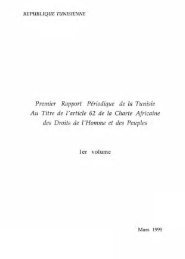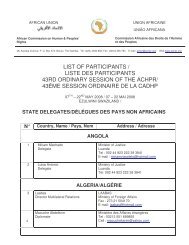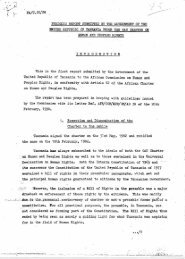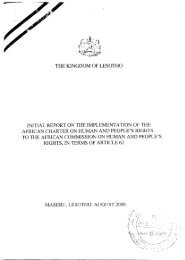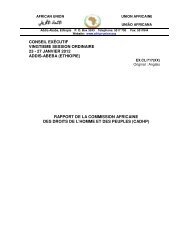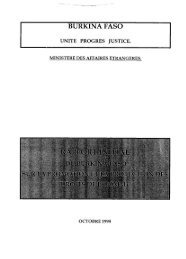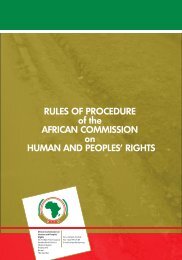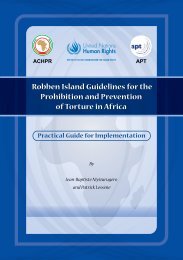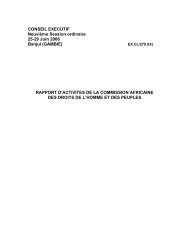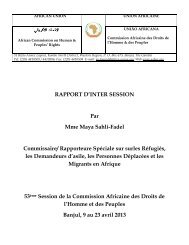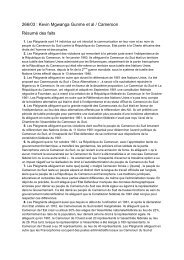307/05 : Obert Chinhamo / Zimbabwe Summary of Facts - African ...
307/05 : Obert Chinhamo / Zimbabwe Summary of Facts - African ...
307/05 : Obert Chinhamo / Zimbabwe Summary of Facts - African ...
Create successful ePaper yourself
Turn your PDF publications into a flip-book with our unique Google optimized e-Paper software.
himself and is his account <strong>of</strong> his personal experience with the law enforcement agents <strong>of</strong> theRespondent State. For this reason he has fulfilled the provision <strong>of</strong> Article 56.4.51. Article 56.5 provides that communications to be considered by the <strong>African</strong> Commission must besent after local remedies have been exhausted. The Respondent State contends that the Complainanthas not complied with this requirement. The State argues that there are sufficient and effective localremedies available to the Complainant in the State, and the Complainant has not sought theseremedies before bringing the present communication before the Commission. On the other hand, theComplainant argues that since he had to flee the country due to fear for his life, he could not comeback to the country to pursue these local remedies.52. The rationale for the exhaustion <strong>of</strong> local remedies is to ensure that before proceedings arebrought before an international body, the State concerned must have the opportunity to remedy thematter through its own local system. This prevents the international tribunal from acting as a court <strong>of</strong>first instance rather than as a body <strong>of</strong> last resort. 553. Three major criteria could be deduced from the practice <strong>of</strong> the Commission in determiningcompliance with this requirement, that is: the remedy must be available, effective and sufficient.54. In Jawara v The Gambia, 6 , the Commission stated that “a remedy is considered available if thepetitioner can pursue it without impediment; it is deemed effective if it <strong>of</strong>fers a prospect <strong>of</strong> success andit is found sufficient if it is capable <strong>of</strong> redressing the complaint”. In the Jawara Communication, whichboth parties have cited, the Commission held that “the existence <strong>of</strong> a remedy must be sufficientlycertain, not only in theory but also in practice, failing which, it will lack the requisite accessibility andeffectiveness. …Therefore, if the applicant cannot turn to the judiciary <strong>of</strong> his country because <strong>of</strong> fearfor his life (or even those <strong>of</strong> his relatives), local remedies would be considered to be unavailable tohim”.55. The Complainant in the present Communication claims that he left his country out <strong>of</strong> fear for hislife due to intimidation, harassment and torture. He said due to the nature <strong>of</strong> his work, the agents <strong>of</strong>the Respondent State started tracking him with a view to harming and/or killing him. He has alsodescribed how he was treated while in detention, noting that he was denied food, he was not attendedto when he complained <strong>of</strong> headache, he was refused visit to the toilet, that the conditions in theholding cells were bad – smelling, small, toilets could not flush, toilets were overflowing with urine andother human waste, the cells were infested with parasites such as mosquitoes which suckedComplainant’s blood for the duration <strong>of</strong> his stay and made sleep impossible for the Complainant, thecell had a bad stench and was very cold, resulting in the Complainant contracting breathing problemsand a cough which lasted for six months, Complainant was refused a blanket during the night andfurther refused permission to take his bath. According to the Complainant, all these constituted tortureand inhuman and degrading treatment.56. The Complainant alleged further that the Respondent State used court remands to deny him <strong>of</strong> atrial within a reasonable time, thus psychologically torturing him and depleting his resources.According to the Complainant, the matter was remanded at least five times – from 20 th September2004 – 21 st February 20<strong>05</strong> (within a period <strong>of</strong> six months), and he noted that these remands werecalculated to harass and psychologically torture him. He said most <strong>of</strong> the time, the Central IntelligenceOrganisation would come and take pictures <strong>of</strong> him thus, intimidating him.57. [The] Complainant added that when he continued publishing the Respondent’s human rightsabuses in Porta Farm, the Respondent State sent its security agents to trail him and on variousoccasions, attempts were made to harm him. According to the Complainant, on 12 th September2004, “man suspected to be a CIO <strong>of</strong>ficial driving a white Mercedes went to the Complainant’s familyand left threatening messages <strong>of</strong> death to Complainant’s brother”. The message from the CIO <strong>of</strong>ficial,according to the Complainant was that the Complainant was an enemy <strong>of</strong> the state and will be killed.[The] Complainant was forced to call his brother to stay with him for security reasons. In anotherincident, the same man, this time accompanied by three others, paid a second visit and issued similarthreats to the Complainant.58. He indicated that on 30 th September 2004, he was stopped by men driving a blue Mercedes Benzwho again threatened him. He said because this later incident took place near his house, it wasenough reason for him to be afraid for his life. He added that in August 2004, on several occasions he



